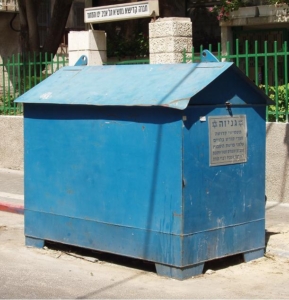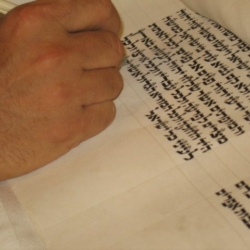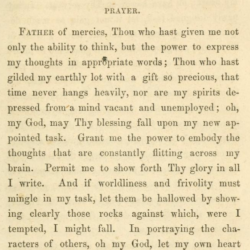| Contribute a translation | Source (English) |
|---|---|
I come today to say goodbye to words that used to speak to me. | |
Or that spoke to G-d through me, or that spoke to me through G-d. | |
However, at this moment, you lie cold and silent and so I too now lack words. | |
Still, I believe you continue to breathe from your mass grave. My bones whisper that your pages and your inks will return to the trees and the plants from where they once came. They say that someday they will even come back to life with words never yet heard. | |
But what of me, how can I now even begin to call out or listen to sounds from other domains, when the present airwaves are so domaim, so mute as to be dead? | |
Yes, we all have secular words, words that serve us in ordinary discourse as well as when we express motions and notions of daily connection and disconnection. | |
On the other hand, words that are holy– that’s a very different story. Like the Ḥassidic Rebbe who said, “before you speak, ask yourself this question: ‘Will your words improve the silence?’”[1] A New England adage of unknown origin. But also note the tradition of appreciating silence among the Ḥasidim of Worke, as described by Elie Wiesel in Somewhere a Master: Further Hasidic Portraits and Legends (New York: Summit Books, 1982), pp.175 | |
If these pages of Tefillah and Torah, of prayer and teachings, have been washed away from our homes and shuls, where DO we find the words to improve the silence? I doubt it will come through mere ego driven words. | |
Perhaps you claim that sacred words actually reside in the depths of our own souls? That prayer and study are more about listening than speaking? | |
In that case, like the words of King Solomon,[2] Cf. 1 Kings 3:9 we ask that G-d grant us ‘Lev Shomei’a,’ a heart that hears through the silence, a heart that hears behind the cry of each dying letter, your insistence on an emergent reality beyond the borders of our sensory world. | |
Therefore, I call out to you, sweet pages, and sadly tattered sheets, you who lie forlorn but not forgotten in the dark, dank, depths of your now subterranean library. I send back to you the luminous angels that we together birthed from our most intimate moments– when, as Rebbe Nachman put it, we formed bouquets from each hallowed letter, each blessed phrase. | |
May your words never expire, but rather — arise and inspire from their hidden tombs to enter a realm where they await a baal hasadeh, a master of the field, a Mashiach, — a shining doula of speech, a conductor with a baton that can again blow life, hope and healing back into pages and souls, back into an earth where trees and plants will once again rejoice with a new song in a rejuvenated creation. |
Notes
| 1 | A New England adage of unknown origin. But also note the tradition of appreciating silence among the Ḥasidim of Worke, as described by Elie Wiesel in Somewhere a Master: Further Hasidic Portraits and Legends (New York: Summit Books, 1982), pp.175 |
|---|---|
| 2 | Cf. 1 Kings 3:9 |

“Prayer for the Interment of Sacred Writing in a Genizah, by Morah Yehudis Fishman” is shared through the Open Siddur Project with a Creative Commons Attribution-ShareAlike 4.0 International copyleft license.










Leave a Reply